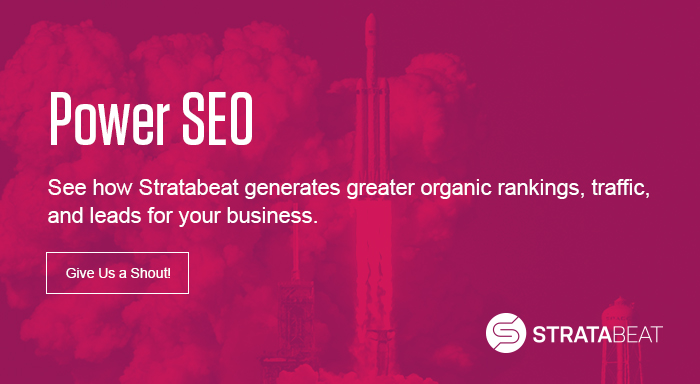The Importance of SEO in Your Marketing Mix

If you’re looking for a way to expand reach, drive greater traffic to your website, and increase your leads in a way that compounds over time, the importance of SEO is indisputable.
SEO, or Search Engine Optimization, is one of the best investments you can make in your marketing overall, let alone your digital marketing.
Here are just a few of the reasons SEO is so critically important to your business:
- B2B companies generate 2X more revenue from organic search than any other channel. (BrightEdge)
- 49% of marketers report that organic search has the best ROI of any marketing channel (Search Engine Journal)
- Organic search produces an average ROI of 5.3X vs. 2X for paid search (Google)
But if you’re confused by how to execute SEO effectively or are having trouble driving actual leads from your SEO efforts, read on. In this post, I explain why SEO matters so much for the success of your business and why you should invest more in SEO, especially in 2022. Let’s go!
SEO Is an Effective Way to Connect with Your Target Audience
SEO is, arguably, the best marketing strategy for connecting with your target audience. It allows for a more natural relationship between your brand and its audience. You connect with them at the precise them they are thinking about a problem, challenge, or objective. It’s the most direct, intuitive line from their interests to your solutions. It enables your marketing to be truly useful to your audience.
SEO also provides critical data about your audience that can be used to help grow the business. And the data collection process is seamless and nonintrusive.
This is particularly important considering that many brands are constantly getting in front of audiences in ways that feel intrusive. People get tired of spammy content, ads that interrupt their use of social media, unsolicited emails, pop-ups, ads before and during the videos they are trying to watch, etc.
Good SEO gives you the opportunity to provide useful content and establish a relationship with existing and potential customers. It’s genuine because you aren’t trying to get people to stop what they’re doing and visit your site. Instead, you’re providing relevant, valuable information at the precise time that it’s of interest to them.
This helps establish credibility and authority with your audience. When they see that what you’re providing is authoritative and trustworthy, you build trust with them. When they go to Google and type in a question related to your solutions or industry, and you come up on the first page, that’s a powerful trust signal.
Organic Search is Often the Primary Source of Traffic
One of the primary reasons SEO is so important is that it’s often the primary source of website traffic. Think about it this way. Google is the only significant website whose primary goal is to get you OFF the site. Platforms like LinkedIn, YouTube, and Facebook want you to stick around as long as possible.
But Google’s goal is to provide you with the best answer to your question as quickly as possible. They want you to find the information you’re searching for. In fact, as mentioned above, 68% of online experiences begin with a search engine. Approximately 89% of B2B marketers use the internet during the B2B research process. And organic traffic from SEO is more than 1,000% higher than from organic social media.
Additionally, Google is increasingly an integral part of our lives. It is the most popular website in the world, with individuals using it multiple times per day to find information. Overall, there are more than 8.7 billion Google searches every day. Combined, Google search, Google Images, and Google Maps account for 92.96% of global traffic.
We use Google to find answers to questions, research new products, and compare prices before buying. It’s become such a part of our lives that it is the de facto way we search for anything on the internet.
We also see the importance of SEO in the way it influences buyers’ opinions about companies. As the primary source of information-seeking worldwide, Google has massive influence over how companies and brands are perceived. If you want your business to be perceived in a positive way, ensure that your website is optimized for search.
If you optimize your website for SEO, you are investing in a reliable source of organic traffic. Yes, the Google algorithm will change over time, but their primary objective will not. If you consistently create high-quality content that thoroughly satisfies searchers, you’ll always be in a great position to receive organic search traffic and drive them to conversion.
With Google search such an integral part of the buying process, it’s critical that your business has a documented SEO strategy. Without this, you’ll miss out on a great volume of traffic from your target audience looking for your types of solutions. It’s as simple as that.
SEO Helps You Understand the Voice of the Customer
SEO work is also important for your business because it helps you better understand the Voice of the Customer (VOC), and by extension, helps you better understand the customer, period.
Through topic and keyword research, you are able to see the words people are using as well as the intent behind those words. This includes broad terms as well as detailed, long-tail multi-word phrases.
In addition, SEO data reveals the questions they are asking online. You can use tools like thruuu, AlsoAsked, and AnswerSocrates to uncover People Also Ask (PAA) questions from the Google search engine results pages (SERPs), Google autocomplete, and Google Trends. Google Question Hub isn’t quite ready for prime time, but it reveals the questions people are asking online without corresponding content available online yet. But in time we hope to see its utility increase and to capture more useful questions being revealed by the platform.
Google Search Console reveals the actual phrases they are using where your website is visible (regardless of what they eventually clicked on).
Autocomplete is a feature within Google Search that makes it faster to complete various searches. As you type your query into the Google search box, Google populates multiple options in a dropdown list for the searcher to choose in the case the options include what the searcher had in mind, thus saving some key strokes. These autocomplete options are another window into how your audience thinks.
In addition, you can check the Google Related Searches at the bottom of each Google SERP. These provide yet even more searches that are related to the current search.
The top search results also help you understand specifically what types of information people are searching for when they type in a specific keyword. Are they looking for an educational overview? Or instead a step-by-step guide, a tool, a checklist, a video, or something else?
Given that SEO enables you to see the language and phrases your audience is using, you can use this language on high profile web pages, like your home page, landing pages, calls-to-action, etc. And you can use it in your marketing campaigns, as well, for even greater impact.
Stronger, Faster, Better SEO
Read Stratabeat’s Advanced Guide to B2B SEO, and Generate More Organic Traffic and Leads.
Search Is an Integral Part of the Customer Journey
Consider all the ways people use search during the customer journey. When they have a problem or challenge, the first place they go is usually Google. They use Google to educate themselves. They search to find answers to their questions. They search to clarify what they should be learning about.
They also use Google search to discover products. And they conduct product research before making a purchase. They use it to compare products and services to make sure they’re making the right choice.
The data backs this up. Before deciding whether or not to buy a product, 89% of B2B researchers use the internet during the B2B research process. On average, a B2B buyer conducts 12 different online searches before interacting with a specific website.
If you aren’t using SEO as part of your digital marketing strategy, you are potentially missing out on a huge amount of revenue.
It’s the Most Cost-Effective Acquisition Strategy
One more of the benefits of SEO is that it allows you to acquire new customers at a relatively low cost compared to other marketing strategies. With acquisitions through organic search, your content keeps driving traffic day after day, month after month, and year after year. You invest once in a content piece, and the returns keep coming and coming.
And as you develop an ecosystem of optimized content, and as you build further trust with Google, it gets easier and easier to achieve high rankings for your content.
It becomes somewhat of a marketing flywheel. It’s like having an additional salesperson on your team.
Compare all of this with PPC ads, and the contrast is clear. Paid search ads are an effective way to drive targeted traffic, but the moment you turn them off, the traffic stops. Additionally, the amount spent on ads erodes margin and increases CAC.
SEO efforts, on the other hand, require a long-term investment but also pays long-term dividends. An in-depth blog post you write may take 6 months before it hits the first page of Google, but it has the potential to generate organic search traffic for years. To top it off, the average ROI on organic search is 5.3X, compared to 2X from paid advertising.
If your website is well-optimized and contains truly valuable content that helps people answer their questions or solve their problems, the odds are good that Google will send traffic your way. As if that isn’t enough, if your content is properly aligned with search intent, your conversion rate will be higher.
SEO Is Outstanding for PR
SEO is also outstanding for PR. As more and more of your pages rank high in search results, your online presence and brand awareness grows. Additionally, your reputation as a trustworthy brand increases. Whether they know it or not, the large majority of people inherently associate first page search results with trustworthiness.
SEO is also important for PR in that it allows you to own the first page search results for branded terms. You don’t want any negative sentiment appearing on Google page one for your branded terms. When someone searches for your business or product, you want to “own” all the non-sponsored links, including news listings.
With SEO topic and keyword research, you can spot what’s trending or spiking in interest. This enables your PR team to capitalize on opportunities to join in the conversation and to grab media exposure opportunistically.
One final reason SEO boosts your PR involves link building, which is a really important part of SEO. If you create a research report and promote it to the media and bloggers, you’ll often secure a write-up or other type of exposure, along with a backlink to your landing page about the report. Another common link building tactic is writing guest posts for well-known industry sites or appearing on relevant podcasts. Not only does this earn you a valuable link back to your website, it also grows your audience. Every time you guest post or appear on a relevant podcast, more people discover you and your brand. In this way, SEO and PR work hand-in-hand – what’s good for one is often good for the other.
SEO Results Compound Over Time
SEO is also unique in that the results compound over time. As we noted, it can take time for pages to begin ranking highly. But once pages start to rank on relevant keywords on the first page of Google, your traffic will grow exponentially.
Additionally, if you have valuable content on your site, it will attract new backlinks over time. And the more links you have pointing to your website, the higher Google will rank your pages.
As your pages begin to rank and you start attracting backlinks, your overall Domain Authority (DA) will grow. Domain Authority is a metric used by SEO tools like Ahrefs to determine a site’s overall authority. While DA is not a Google ranking factor, it is calculated using things that ARE ranking factors, like backlinks, overall SEO health of your site, etc. All things equal, a higher DA translates into higher search engine rankings.
Put simply, SEO creates a virtuous upward cycle. It really is a case of a rising tide lifting all boats. The more trustworthy your business is to Google, the easier it becomes to achieve a high ranking for a new piece of content. And, once you secure sufficient topical authority, it gets easier to rank for tangential topics as well. Think of it as tree rings. You first secure the inner rings, and as they thicken and strengthen, you build more and more outer rings.
Higher rankings lead to more traffic, which generates more backlinks, which increases your Domain Authority, which leads to higher rankings, etc.
SEO Creates a Superior User Experience
Google has been increasingly using user experience as a factor in determining where to rank pages. Google wants to deliver the best experience possible and it doesn’t want to send people to pages that are difficult to use.
Creating a superior user experience requires:
- Site optimized for mobile users
- Load times optimized for speed
- Limited disruptions, such as pop-ups or ads
- Easy-to-understand navigation
- Relevant internal links
Additionally, organizing your content in ways that are intuitive helps both searchers and Google understand how to navigate through your site to easily find the information they are seeking. Are the different sections in your website clearly labeled? Are the sub-sections and categories intuitive? Is it clear how pages relate to one another?
SEO Is Measurable
The importance of SEO is further evidenced when you consider how quantifiable it is. From data on the number of searches per keyword per country to keyword difficulty, organic traffic, and backlinks, organic search is highly measurable.
And you can slice and dice the data for even greater insights.
For example, you can look at organic numbers for first-time vs. returning visitors. Or organic search stats per city or state. Or pages per visit from organic visits. The more granular your view, the clearer and more valuable the insights can be.
SEO Is One of the Best Long-Term Marketing Investments
SEO is important because it’s the only marketing strategy where your results keep getting better over time. It’s a long-term, digital marketing strategy that produces consistent, positive results.
This is why it’s helpful to approach SEO as an investment. The more you invest, the greater the returns.
Think of it like any business. You invest so that the business can produce greater and greater returns. This includes investing in a strong, secure, and fast website hosting platform. It includes investing in airtight coding. In addition, it includes investing in usability, on-page SEO, high-quality content, and content distribution and amplification.
For example, for one of Stratabeat’s clients, we increased organic traffic by 7,235.7% (yes, you read that right!). However, it took three years to achieve this. In other words, it took an investment.
It’s surprising how many B2B companies with a long sales cycle shy away from B2B SEO. Even if search volume for related keywords is relatively low, SEO ROI is often outsized. The reason is that, if your business’ sales cycle is long and if your offering is high-priced, then the objective of your marketing should be to laser target on highly qualified audience members throughout the customer journey. SEO is perfect for this.
It aligns with the way they think. It puts your brand in front of them at the precise time they have a question or are seeking more information. It helps you engage with them throughout the entire customer journey. SEO is effective for both demand generation and lead generation. SEO enables you to build a moat around your business. And as mentioned earlier, it’s like having an additional salesperson who is working 24/7 for your business.
Take a moment to think about the financial impact to your business if you had one more salesperson. And one who was relentless and required zero sleep.
When integrated with PR, content marketing, and social media, it’s even more effective. When SEO is implemented in coordination with other forms of marketing, it helps amplify your brand, strengthen your message, and capture demand.
Bet Big on SEO
Hopefully by this point you’re convinced of the importance of SEO. It truly is one of the most effective digital marketing tools available.
Is it easy? No. It’s not a magical silver bullet that will transform your business overnight. It’s more like going to the gym. In the early stages, it can seem like you’re not making progress. But if you stick with it, there comes a point when you realized you’re in significantly better shape than when you first started. And then, you start to notice how much stronger you feel. You see the health benefits positively impacting your entire life.
If you want to strengthen your brand, go to the SEO “gym”. SEO has transformed many businesses. Use it to transform yours as well.
Not sure where to start? Book a Strategy Call, to see how SEO for technology companies could help your business. We’re a B2B SEO agency that can help you implement a powerful SEO strategy that works!




